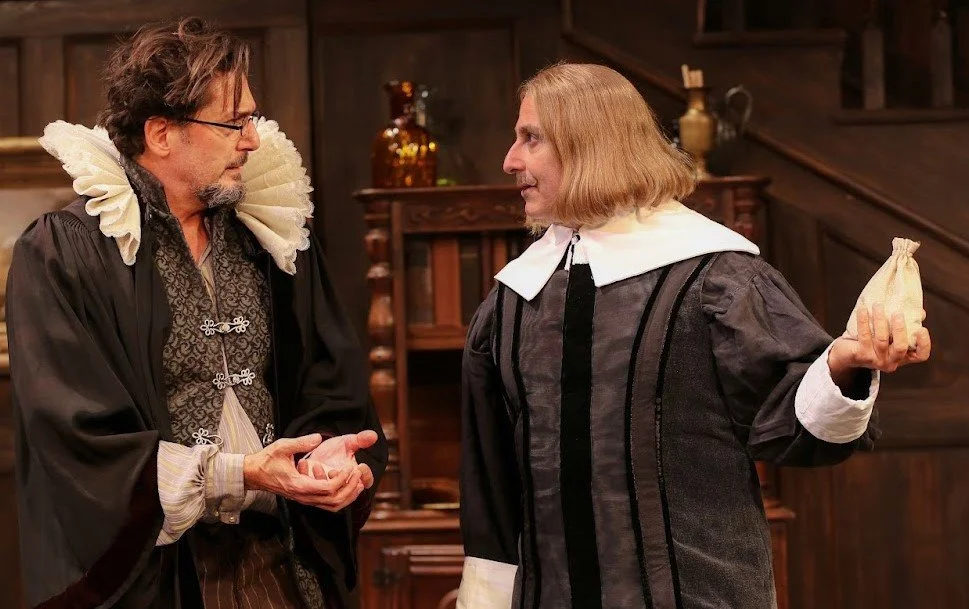Reg Rogers (left) is Subtle, the alchemist, Jennifer Sánchez is Dol Common, and Manoel Felciano is Face, the three con artists at the center of Ben Jonson’s 1610 comedy The Alchemist.
The Red Bull Theater Company was founded in 2003 to present the talented playwrights of Shakespeare’s time who have been overshadowed by the Bard to new audiences. Among its productions have been The Changeling (Thomas Middleton and William Rowley), Women Beware Women (Middleton alone) and ’Tis Pity She’s a Whore (John Ford). In the years since, the mission has evolved into “classics” outside the 17th century as well—the company’s The Government Inspector, a Nikolai Gogol play of 1836, was one of its most exhilarating triumphs. Now Jeffrey Hatcher, who adapted the Gogol, has given an assist to Ben Jonson’s The Alchemist—with an infusion of Blackadder.
Felciano as Face (right) dons a disguise as “Lungs” to help swindle Jacob Ming-Trent (left) as Sir Epicure Mammon, a falsely pious specimen of the upper classes in 17th-century London.
Guided by Red Bull artistic director Jesse Berger, a terrific cast throw themselves into this frantic farce, still set in the 1600s but with anachronistic touches. Although Jacobean purists might object, Berger’s production is certainly a lot of fun, if at times exhausting. Unlike Jonson’s Venetian Volpone, The Alchemist takes place in London, where, Jonson writes in his original Prologue, “No clime breeds better matter for your whore,/Bawd, squire, impostor, many persons more.…”
The setting is a dark-paneled townhouse that has been forsaken by its owner, Lovewit, who has fled to the countryside because of the raging plague. He has left behind a butler, Face (Manoel Felciano), to watch over it. The unscrupulous Face has enlisted a vagabond, Subtle (Reg Rogers), and a prostitute, Dol Common (Jennifer Sánchez), to help him flimflam London’s citizens from the respectable-looking house. He has spread the word that Subtle is an alchemist—one who turns base metals into gold.
The crooks have found three promising marks. The first is Nathan Christopher’s grinning dunce, Abel Drugger, a young man who has opened a business nearby and wants some advice from Subtle. “This is a diagram of my tobacco shop,” Drugger explains. “I’ve heard that placing one’s door, shelves and counters according to the stars will determine one’s success.” It’s a measure of Jonson’s fundamental timelessness that his original incorporates this moment of 17th-century feng shui—and Hatcher makes more of it than Jonson did.
Teresa Avia Lim is Dame Pliant and Nathan Christopher is Abel Drugger, a young and gullible shopkeeper. Photographs by Carol Rosegg.
The second mark is Carson Elrod’s feckless Dapper, who, Face tells Subtle, is “gainfully employed, consorts with many of the lesser poets, and is the sole hope of his aging mother.” Dapper seeks a “familiar”—an animal or a charm to give him luck at “the gaming tables.” Last is Sir Epicure Mammon (Jacob Ming-Trent), a horny fashion plate “whom we have kindled with tales of an alchemical stone which can transform any metal into gold,” says Face.
Things begin to unravel when Lovewit sends word that he will return in two hours—and the crooks scramble to complete their cons. Meanwhile, complications with even more people ensue, including a Puritan (Stephen DeRosa) named Ananias and a young man named Kastril (Allen Tedder), eager to learn the art of quarreling, along with his sister, a marriageable widow (Teresa Avia Lim).
Farce needs plenty of doors, and Alexis Distler has provided them, along with a secret panel and a trapdoor. She has decorated the set with swords, shields, crossed halberds, and a deer’s head, but updated the period from 1610 to 1636, at least, although the necessity is unclear. Given that the triple portrait of Charles I that hangs on a wall dates from 1635, talk of the plague presumably refers to an outbreak in 1636 rather than in 1603. Tilly Grimes has done the mostly period costumes, and one from much, much later, along with plentiful disguises.
Subtle tries to trick Ananias (Stephen DeRosa, right), a Puritan from the severe Anabaptist sect, out of his money in The Alchemist.
Still, the breakneck production is only occasionally sprinkled with anachronisms: there’s modern music (by Greg Pliska) that includes a reference to James Bond, and Surly (Louis Mustillo), the sidekick to Sir Epicure, hails from the Dutch colony of Brooklyn—complete with accent. And Hatcher inserts topical spin into the dialogue. “I thought all the shops had been closed by the plague,” says Subtle on meeting Drugger. “Aye,” answers the shopkeeper, “but as I am a tobacconist who sells liquor, I am deemed essential.”
Lovers of the Jacobeans will be disappointed to know that The Alchemist needs a great deal of Hatcher’s help, but, truth to tell, even a more faithful 1996 London production that starred Simon Callow and Tim Pigott-Smith didn’t provide as much laughter as Berger and Hatcher’s collaboration. The Alchemist is a wild romp for the holidays.
The Red Bull Theater production of Ben Jonson’s The Alchemist plays through Dec. 19 at New World Stages (340 W. 50th St.). Evening performances are at 7 p.m. Monday, Wednesday and Thursday and at 8 p.m. Friday and Saturday, with a 7 p.m. performance on the closing day; matinees are at 2 p.m. Saturday and Sunday. For tickets and information, visit redbulltheater.com.






